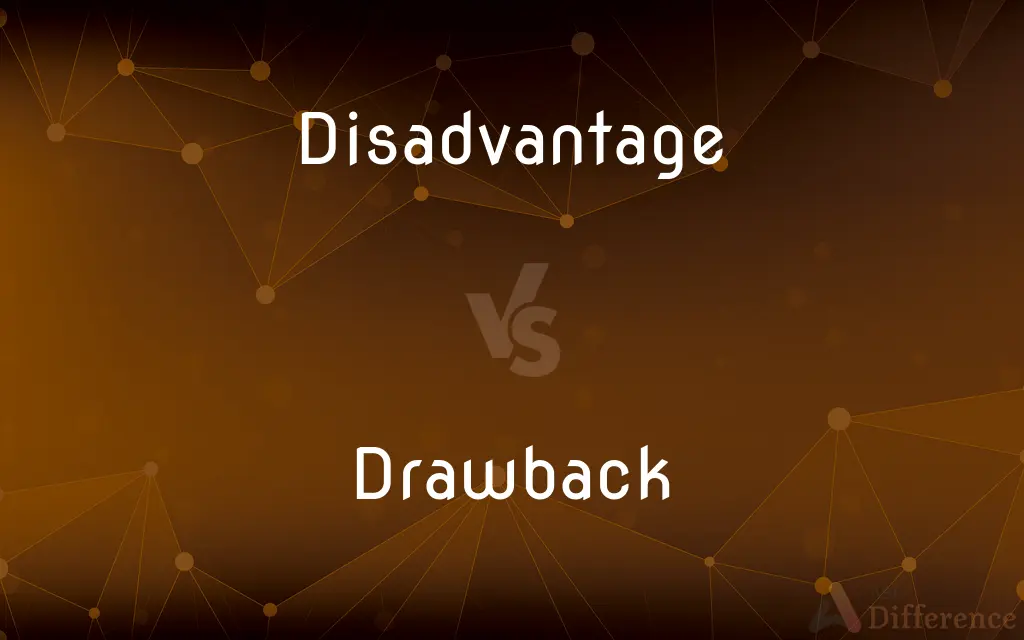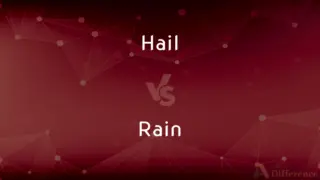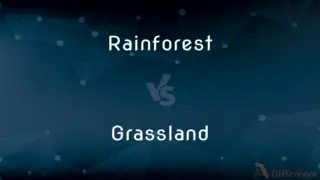Disadvantage vs. Drawback — What's the Difference?
By Tayyaba Rehman & Fiza Rafique — Updated on April 20, 2024
Disadvantage refers to a detrimental factor impacting one's ability to succeed; drawback is a specific negative aspect or feature that detracts from the overall value.

Difference Between Disadvantage and Drawback
Table of Contents
ADVERTISEMENT
Key Differences
A disadvantage is a general condition or situation that reduces the chances of success or efficiency, such as a lack of resources in a company. On the other hand, a drawback specifically refers to negative elements within an otherwise advantageous scenario, like high costs in a lucrative business.
Disadvantages can affect broad aspects of life or specific activities, impacting overall performance and outcomes. Whereas drawbacks, while also negative, typically highlight particular flaws or limitations that don't necessarily compromise the whole.
In competitive settings, disadvantages might include inferior technology or skills, severely affecting competitiveness. Conversely, drawbacks might be less critical, such as an inconvenient feature in a software that doesn't deter from its overall utility.
When planning strategies, identifying disadvantages is crucial for fundamental improvements or changes, while recognizing drawbacks aids in refining or optimizing details without extensive overhauls.
Disadvantages often require significant resources and strategic changes to overcome, impacting long-term planning and execution. Drawbacks, however, might only necessitate minor adjustments or can sometimes be tolerated if their impact is limited.
ADVERTISEMENT
Comparison Chart
Definition
A condition or situation that lessens effectiveness or success
A specific negative feature within a broader beneficial context
Scope
Can be broad affecting overall outcomes
Generally narrow, affecting specific elements
Impact on Success
Usually significant, potentially fundamental
Often limited, more about inconvenience or minor issues
Required Response
Often needs strategic or substantial changes
May need minor adjustments or can be tolerated
Examples
Lack of experience in a job market
High investment cost in a profitable venture
Compare with Definitions
Disadvantage
A loss or damage to one's position or situation.
The team's disadvantage increased with the loss of their best player.
Drawback
A limiting factor in an otherwise suitable plan.
The software’s complexity is a drawback for new users.
Disadvantage
A negative aspect of a situation that affects overall performance.
A disadvantage of living in the city is the high cost of living.
Drawback
A negative point or aspect that detracts from a positive one.
The only drawback to the laptop is its weight.
Disadvantage
A factor that reduces one’s chances of success.
The main disadvantage of the new software is its complexity.
Drawback
A disadvantage specific to a context or scenario.
The drawback of buying a house in this area is the annual flooding risk.
Disadvantage
A condition that puts someone at a less favorable position.
His lack of formal education was a significant disadvantage in his career advancement.
Drawback
A feature that renders something less acceptable.
The major drawback of this plan is its high cost.
Disadvantage
The state of being worse off or poorly equipped.
Rural areas are at a disadvantage due to limited access to advanced healthcare.
Drawback
A hindrance or defect in a plan or product.
A drawback of the phone is its poor battery life.
Disadvantage
In policy debate, a disadvantage (abbreviated as DA, and sometimes referred to as: Disad) is an argument that a team brings up against a policy action that is being considered. A disadvantage is also used in Lincoln Douglas Debate.
Drawback
Drawback, also known as duty drawback is the refund of duties, certain taxes, and certain fees collected upon the importation of merchandise into the United States. Refunds are only allowed upon the export/destruction of the imported merchandise or a valid substitute, or the export/destruction of a certain article manufactured from the imported merchandise or a valid substitute.
Disadvantage
An unfavorable condition or position
Students who are at a disadvantage because they don't own computers.
Drawback
A disadvantage or inconvenience.
Disadvantage
Something that places one in an unfavorable condition or position
A disadvantage to living there is that you'd have no access to public transportation.
Drawback
A refund or remittance, such as a discount on duties or taxes for goods destined for reexport.
Disadvantage
Damage or loss, especially to reputation or finances; detriment
High gasoline prices have worked to the company's disadvantage.
Drawback
A disadvantage; something that detracts or takes away.
Poor fuel economy is a common drawback among larger vehicles.
Disadvantage
To put at a disadvantage; hinder or harm.
Drawback
A partial refund of an import fee, as when goods are re-exported from the country that collected the fee.
Disadvantage
A weakness or undesirable characteristic; a con.
The disadvantage to owning a food processor is that you have to store it somewhere.
Drawback
The inhalation of a lungful of smoke from a cigarette.
Disadvantage
A setback or handicap.
My height is a disadvantage for reaching high shelves.
Drawback
A loss of advantage, or deduction from profit, value, success, etc.; a discouragement or hindrance; objectionable feature.
The avarice of Henry VII . . . . must be deemed a drawback from the wisdom ascribed to him.
Disadvantage
Loss; detriment; hindrance.
Drawback
Money paid back or remitted; especially, a certain amount of duties or customs, sometimes the whole, and sometimes only a part, remitted or paid back by the government, on the exportation of the commodities on which they were levied.
Disadvantage
(transitive) To place at a disadvantage.
They fear it might disadvantage honest participants to allow automated entries.
Drawback
The quality of being a hindrance;
He pointed out all the drawbacks to my plan
Disadvantage
Deprivation of advantage; unfavorable or prejudicial quality, condition, circumstance, or the like; that which hinders success, or causes loss or injury.
I was brought here under the disadvantage of being unknown by sight to any of you.
Abandoned by their great patron, the faction henceforward acted at disadvantage.
Disadvantage
Loss; detriment; hindrance; prejudice to interest, fame, credit, profit, or other good.
They would throw a construction on his conduct, to his disadvantage before the public.
Disadvantage
To injure the interest of; to be detrimental to.
Disadvantage
The quality of having an inferior or less favorable position
Disadvantage
Put at a disadvantage; hinder, harm;
This rule clearly disadvantages me
Common Curiosities
Can a drawback be ignored in planning?
Depending on its severity, a drawback can sometimes be overlooked if it does not critically hinder the main advantages of a scenario.
What is a disadvantage?
A disadvantage is a condition or factor that significantly reduces the effectiveness, efficiency, or success of someone or something.
What constitutes a drawback?
A drawback is a specific negative feature within a scenario, which, while making it less desirable, does not necessarily nullify its overall potential benefits.
How should one address a disadvantage?
Addressing a disadvantage often requires significant adjustments, strategic planning, and resources to effectively overcome the challenges posed.
What are the typical responses to drawbacks?
Drawbacks typically require more focused solutions, often minor, to improve the situation without extensive changes.
What is the relationship between a disadvantage and a drawback?
While both terms imply negative aspects, disadvantages are usually more pivotal to overall success, whereas drawbacks are specific issues within a generally positive context.
What is an example of a disadvantage in business?
A common disadvantage in business is entering a market with a high level of competition without a distinct competitive advantage.
Can a drawback diminish the value of a product?
Yes, while not always critical, drawbacks can lessen a product's appeal or utility to potential consumers.
Is a drawback always a disadvantage?
Not necessarily; drawbacks are negative aspects but they do not always amount to a full disadvantage in the overall scenario.
How do disadvantages affect decision-making?
Disadvantages often require more comprehensive consideration and planning to mitigate their broader impacts on success or functionality.
How does one identify a disadvantage in a strategy?
Identifying disadvantages in a strategy involves analyzing potential risks and negative outcomes that could impair achieving strategic goals.
Can a disadvantage be turned into an advantage?
Yes, with creative strategies and changes, some disadvantages can be transformed into advantages.
Are drawbacks significant in product development?
Yes, identifying and addressing drawbacks during product development is crucial for creating a competitive and appealing product.
What is an example of a drawback in technology?
An example of a drawback in technology could be high energy consumption by an otherwise efficient device.
How do disadvantages impact personal development?
Disadvantages can hinder personal development by creating barriers that are difficult to overcome without additional support or resources.
Share Your Discovery

Previous Comparison
Hail vs. Rain
Next Comparison
Rainforest vs. GrasslandAuthor Spotlight
Written by
Tayyaba RehmanTayyaba Rehman is a distinguished writer, currently serving as a primary contributor to askdifference.com. As a researcher in semantics and etymology, Tayyaba's passion for the complexity of languages and their distinctions has found a perfect home on the platform. Tayyaba delves into the intricacies of language, distinguishing between commonly confused words and phrases, thereby providing clarity for readers worldwide.
Co-written by
Fiza RafiqueFiza Rafique is a skilled content writer at AskDifference.com, where she meticulously refines and enhances written pieces. Drawing from her vast editorial expertise, Fiza ensures clarity, accuracy, and precision in every article. Passionate about language, she continually seeks to elevate the quality of content for readers worldwide.
















































